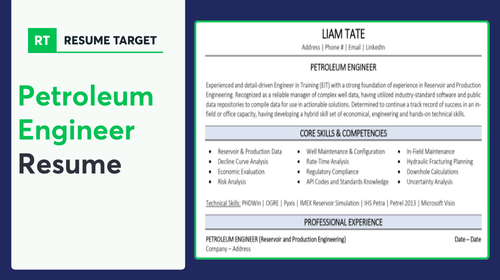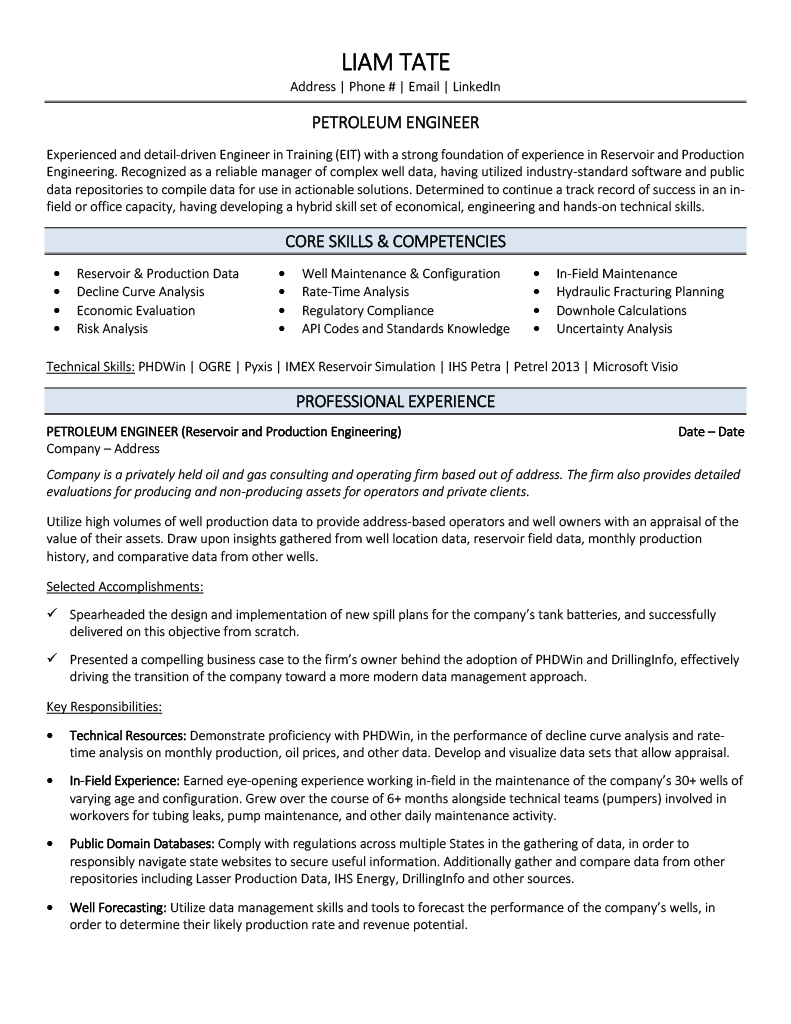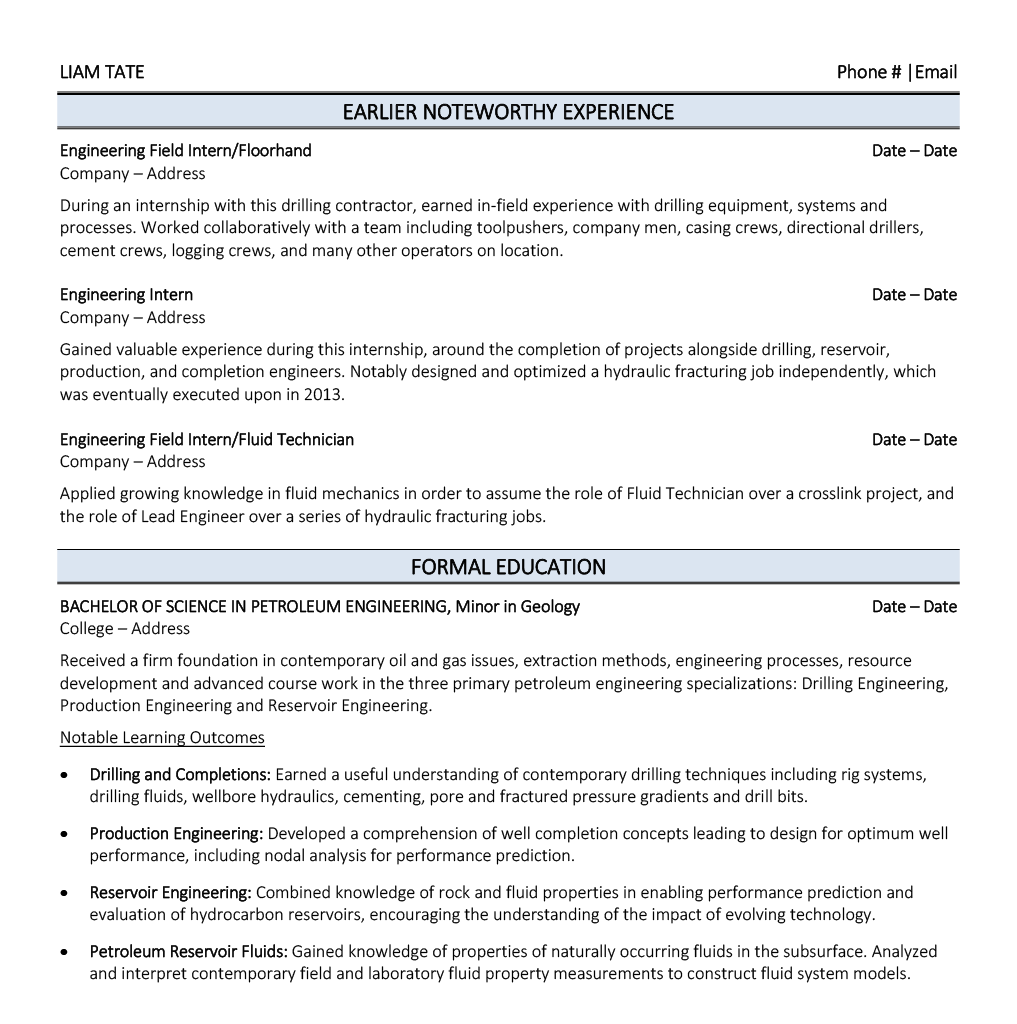

In the competitive world of petroleum engineering, technical expertise alone won't get you noticed. Your resume needs to showcase both your engineering achievements and your impact on production efficiency.
Are you struggling to translate complex drilling operations and reservoir management into compelling resume content? We'll help you transform technical jargon into clear, powerful statements that catch hiring managers' attention.
Resume Target specializes in helping petroleum engineers stand out in a crowded field. Our proven approach highlights your technical skills while demonstrating your direct contribution to operational success and bottom-line results.


At the forefront of global energy production, petroleum engineers are the technical masterminds who develop innovative methods to extract oil and gas from deep within the Earth, with their work directly impacting global energy production and extraction efficiency.
In this dynamic role, you'll collaborate with geoscientists to analyze geological data, design sophisticated drilling systems, and develop strategic extraction plans that balance maximum resource recovery with environmental responsibility and cost effectiveness.
Whether you're interested in becoming a drilling specialist, reservoir engineer, or production expert, the petroleum engineering field offers diverse career paths where your technical expertise can evolve alongside advancing technologies and growing global energy demands.
Let's talk about what makes petroleum engineering such an exciting career path! Your earning potential in this field is truly remarkable, with compensation ranging from entry-level positions all the way up to executive roles in major energy companies. And guess what? The industry rewards your expertise handsomely, especially if you specialize in areas like management or oil and gas extraction.
Figures from: U.S. Bureau of Labor Statistics
Starting as a petroleum engineer opens doors to leadership roles in energy companies. With experience and expertise, you can progress from field operations to managing entire engineering departments.
To accelerate your career growth, you'll need to master both technical expertise and leadership capabilities that set you apart in the energy sector.
- Reservoir Engineering and Simulation - Drilling and Completion Engineering - Advanced Software Proficiency (PETREL, Eclipse) - Strategic Project Management and Team LeadershipLaunch your petroleum engineering career by combining a bachelor's degree in petroleum or related engineering field with hands-on experience through internships and entry-level positions in oil and gas companies.
To advance in this field, you'll need to develop key technical competencies like reservoir engineering and drilling completion engineering, while building your project management abilities.
Requirements from Visuna
From Texas oil fields to Alaska's reserves, petroleum engineering jobs span energy-rich states with diverse industry needs.
Figures from U.S. Bureau of Labor Statistics
Struggling to translate your complex well site monitoring experience and technical expertise into a compelling mud logging technician resume that catches a hiring manager's eye? This comprehensive, section-by-section guide will show you exactly how to showcase your geological analysis skills, safety record, and drilling operations knowledge in a format that gets results.
If you're like most mud logging technicians, condensing years of wellsite experience and technical expertise into a few powerful sentences can feel more challenging than interpreting complex lithology samples.
While you excel at analyzing drilling parameters and providing critical real-time formation data, translating those specialized skills into a compelling summary that catches a hiring manager's attention requires a different kind of precision - but it's essential for standing out in today's competitive energy sector.
How would you describe your expertise in formation evaluation techniques and your ability to interpret geological data across different drilling environments?
Reason: This helps establish your core technical competency and showcases your breadth of experience across various geological settings, which is crucial for a strong mud logging summary.
What combination of technical skills and safety protocols have you mastered throughout your career in wellsite operations?
Reason: This question helps articulate your balanced approach to technical expertise and safety consciousness, two critical aspects that employers prioritize in mud logging professionals.
How would you characterize your ability to collaborate with drilling crews and communicate critical data to various stakeholders in the field?
Reason: This helps highlight your interpersonal capabilities and communication skills, which are essential for effective mud logging operations and team integration on drilling sites.
As a mud logging technician, you need to showcase both your technical expertise in analyzing drilling data and samples, as well as your ability to maintain accurate records and communicate findings effectively.
Your resume should highlight your proficiency with mud logging equipment and software, while also emphasizing your attention to detail and ability to work long shifts in challenging drilling environments.
Showcase your wellsite expertise by organizing your experience into three powerful sections: a concise role overview that sets the stage, quantifiable achievements that highlight your monitoring successes, and core responsibilities that demonstrate your technical proficiency in formation evaluation and drilling operations.
Many mud logging technicians struggle to translate their technical monitoring and analysis work into compelling achievements that catch hiring managers' attention. Transform your daily drilling observations and data collection into powerful metrics by connecting your vigilance to prevented disasters, cost savings, and improved drilling efficiency outcomes.
A strong responsibilities section demonstrates how mud logging technicians contribute to drilling operations beyond basic monitoring tasks. Your role directly impacts drilling safety and efficiency, so explain your duties in terms that showcase both technical expertise and business value.
As a mud logging technician, your educational background in geology, earth sciences, or petroleum engineering forms the foundation of your expertise. Focus on highlighting relevant certifications in well control, safety training, and any specialized mud logging equipment certifications you've earned, as these are what drilling companies look for first.
Now that you've built a strong foundation using Resume Target's comprehensive resume writing guidelines, you're ready to transform your petroleum engineering resume from good to exceptional.
While many candidates focus solely on customizing their cover letters, tailoring your petroleum engineer resume for each position is crucial in today's competitive oil and gas industry.
A customized resume not only helps you navigate through ATS systems by incorporating role-specific keywords like "reservoir simulation,""well completion,"and "production optimization,"but also demonstrates to hiring managers that your experience perfectly aligns with their specific drilling operations and project requirements.
Ready to stand out in the petroleum engineering field? Let's transform your resume into a powerful tool that speaks directly to employers and lands you those crucial interviews!
Don't let a lack of field experience hold you back from launching your petroleum engineering career! Your engineering degree, technical skills, and hands-on lab work are exactly what employers want to see from entry-level candidates.
Even without years of industry experience, you can create an impressive resume by highlighting your engineering coursework, relevant projects, and internships that demonstrate your understanding of reservoir analysis, drilling operations, and production methods.
Focus on showcasing your technical abilities, academic achievements, and any petroleum industry exposure through internships or research projects.
For a detailed breakdown of how to present your qualifications, check out our Student Resume Writing Guide to create a resume that stands out to engineering recruiters.
Your resume summary is your chance to showcase your engineering education, technical skills, and relevant project work - even without years of industry experience.
Focus on highlighting your petroleum engineering coursework, laboratory experience, and any internships or research projects that demonstrate your practical understanding of reservoir engineering and drilling operations.
"Detail-oriented and technically skilled Petroleum Engineering graduate with comprehensive academic training and hands-on laboratory experience in reservoir simulation and well testing. Demonstrated strong analytical abilities through completion of three industry-relevant research projects focusing on enhanced oil recovery techniques. Proficient in industry-standard software including PETREL and Eclipse, with experience analyzing well data and creating reservoir models. Seeking to leverage strong engineering foundation and passion for energy optimization to contribute technical value as an entry-level Petroleum Engineer."
Now's your chance to showcase the specialized knowledge and technical expertise you gained through your petroleum engineering studies - from reservoir mechanics to drilling operations!
Transform your academic achievements into compelling content by highlighting relevant coursework like "Advanced Reservoir Engineering"and describing hands-on projects where you modeled oil recovery systems or optimized drilling parameters.
unavailableRelevant Coursework: Reservoir Engineering | Drilling Engineering | Petroleum Production Systems | Rock Mechanics | Well Completion Design | Formation Evaluation
Key Projects:
Enhanced Oil Recovery Simulation Project: Developed and executed a comprehensive reservoir simulation model to evaluate various EOR techniques for improving oil recovery in a mature field.
Offshore Well Design Optimization Study: Collaborated with a team of four to design an offshore well completion strategy that maximized production while maintaining well integrity.
Leverage your academic training, internship experiences, and technical certifications to create a compelling skills section that showcases your readiness for a petroleum engineering role, incorporating both theoretical knowledge and hands-on capabilities.
As an entry-level petroleum engineer, your combination of technical knowledge and analytical capabilities positions you well for a growing energy sector that values fresh perspectives and innovative thinking in both conventional and renewable energy projects.
Let's face it - trying to explain complex reservoir simulations, drilling optimization, and production enhancement techniques in a way that both technical and non-technical hiring managers understand can feel like threading a needle in the dark.
At Resume Target, we've mastered the art of translating intricate Oil and Gas expertise into compelling career stories that resonate with hiring managers.
Our deep understanding of the petroleum engineering field means we know exactly how to showcase your achievements, whether you're optimizing well performance or implementing new recovery methods.
With major Oil and Gas companies ramping up their hiring efforts in response to global energy demands, now is the perfect time to transform your technical expertise into a powerful career narrative - let's get started with a free consultation today.
Impress any hiring manager with our Oil & gas resume writing service. We work with all career levels and types of Oil & gas professionals.
Learn More → Oil & gas Resume Writing Services